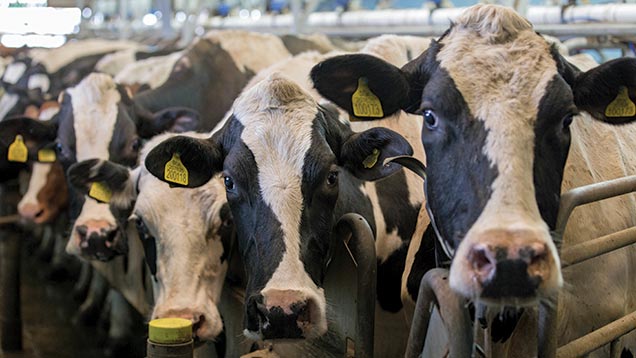Dairy crisis: expert financial advice for farmers
 © Tim Scrivener
© Tim Scrivener Many dairy businesses do have options, it’s a question of getting beyond the day-to-day challenges to be able to consider what those options might be, says Kevin Edwards of the Farm Consultancy Group.
In the short-term, meeting loan repayments will be one of the main concerns for many.
“It’s far better to get in touch and negotiate a repayment holiday or other arrangement with the bank, than to let things get to the point where you simply can’t meet your commitments,” says Mr Edwards.
“No-one wants to default and no-one wants a defaulter. A capital repayment holiday, while it will incur extra interest in carrying part of the loan forward, should incur minimum fees from the bank. Talk to machinery firms too to see if you can reschedule payments.”
See also: Dairy survival – four key action areas
Owner occupiers will obviously have more options than tenants but there may be the possibility of assigning Basic Payment Scheme (BPS) payments to the bank to stabilise the position, he suggests.
If you’ve been affected by any of the issues in this article, help is at hand. Call Farming Help on 0845 367 9990 (7am to 11pm) or visit the website
Many farmers will also be entitled to benefits of which they may not be aware, he says. Check what benefits you may be entitled to, either through the Citizens’ Advice Bureau or through one of the rural or other charities.
There is also the option to restructure the business or give yourself some breathing space – for example, renting out cows for a few months or on a long-term basis, suggest Mr Edwards.
There could be potential herd health issues with this approach but, properly managed, this could allow time to restructure at home, while earning a cow rental income of £150-250 a cow annually (depending on cow type and value) for the rental of the cows to another milk producer.
There are many ways to structure such arrangements, says Mr Edwards, but typically the cows would leave the home farm while the youngstock and replacements would remain – replacements would be provided to the farm taking on the cows but cull cow and calf income stays with the home farm.
This would release land to grow crops on a contract basis, for example, or to let some land. It would also free up labour and management time, possibly allow some machinery to be sold and give a breathing space for longer-term options to be weighed up.
Reducing the demand on labour can prompt a review of staffing levels, free up family members to concentrate on other enterprises or to earn money off the farm, potentially also reducing stress levels.
Contract dairy farming is another option, although probably not for those on low milk prices, says Mr Edwards.
Contract dairy agreements typically are a joint venture between the host farm, which puts the land and buildings into the agreement, while the contractor provides the labour.
A contract farming account is set up to pay the variable costs of production and to receive the milk income. Any surplus after paying a charge to each party is then shared.
With those running family dairy businesses strongly bound emotionally to their cows, a complete exit from milk production is very hard to contemplate, he acknowledges. However, if a business is already losing net worth and looks likely to continue to do so under its current structure, younger farmers or successors are less likely to allow this to continue, says Mr Edwards.
DairyCo consultancy help for milk producers
Mr Edwards is one of several consultants retained by DairyCo to give levy-funded business advice, which will be offered at no cost to milk producers for one day’s consultancy.
Farmers can get help if they face a sudden drop in their business income and they are:
- at risk of not being able to pay bills
- about to reach their borrowing limit
- don’t have cashflow or budgeting so do not know their position.
The support will involve drawing up a cashflow forecast and working out what can be done to ease some of the demands on the business.
To find a participating consultant in your area, contact Barbara Dunn at DairyCo on 02476 478 684.
